We boarded the Békásmegyer-bound HÉV (H5) with the excitement of children going on their very first field trip, because we heard that a Turkish bakery hides in the shadow of the panel buildings – a confectionery that surpasses most of its Hungarian competitors, both in quality and creativity. However, when we approached Pasha Bakery, we could not immediately sense this by the exterior.

Nonetheless, the intelligence we received proved to be true, as we soon found the family business that opened on May 22 a few steps away from the underpass. The owner, Halil Copuroglu (who has been living in Budapest since 1984), welcomed us in a friendly manner along with his Hungarian wife. The man told us that he dreamed up the shop around seven years ago, because he missed the Turkish pastries of his native land, and had enough of the poor selection of them available in local bakeries, unchanged for at least 30 years. Initially, he wanted to open a baklava manufactory, he added, but then decided to knead bigger dough.

In terms of design, the store could be considered an empty canvas: except for the counter and a few plants, nothing decorates the desolated walls. However, this is a bakery, not an exhibition hall, so we do not even have to look around – the only thing that matters is lined up behind the counter, not on the walls.

But what is the essence of a genuine Turkish bakery? After a brief crash course on Turkish delights, Halil invites us to taste their pastries, because as we know, the proof of the pudding (and Turkish pastries) is in the eating.

We started with a Turkish pizza, which is like a thick pancake that we have to roll up and then sprinkle with lemon juice. This was followed by some apple sticks, then the börek (300-400 HUF), the Tahini roll (290 HUF), the teacake (290 HUF/10 dkg), and in the end, we finally tried the bakery's famous baklava (250 HUF). We were a bit reluctant about the latter, since all the baklavas we've had up to now were too sugary. However, now we learned that we never ate real baklava before: this version, even though it was still sweet, proved to be refreshing and filling without causing any unnatural movements in our stomach. We wolfed down three of them with ease.

The secret is in the high-quality ingredients, preparation techniques, and naturally the baker’s experience: the master here happens to be a Turkish man, Ahmet, who named the Hungarian-style cocoa rolls after himself. He did not know anything about Magyar pastriesy before, but started creating them after several customers asked him to make it.

Among Turkish delights, heavier-bodied and flaky pastries, yellow sesame seeds, and tahini seem to dominate, so if you do not like sweeter flavors, you won't like about half of the pastries here.

In addition to returning guests, some wide-eyed new visitors arrived while we were eating: the staff had to explain to some of them that if they want pizza, they have to go to an Italian restaurant; some of them had to be convinced to try the savory Turkish scone, which is different from Hungarian scones in that the cheese is inside the pastry instead on top of it. There was also a “guest” who brought in a few kilograms of walnuts, which Halil accepted gratefully and took to the kitchen.

He told us that this is how things work around here. Pasha Bakery plays an important role in the area: many residents come here on a daily basis for their breakfast and morning coffee. Therefore, traffic is highest in the morning hours, but if necessary, they start up the kitchen in the afternoon as well to make another batch of everything. Nowadays, they have been thinking about expanding to downtown and opening a Turkish confectionery, but these are only long-term plans for now.
Pasha Bakery
Address:
1039 Budapest, Heltai Jenő tér 7.
Facebook




